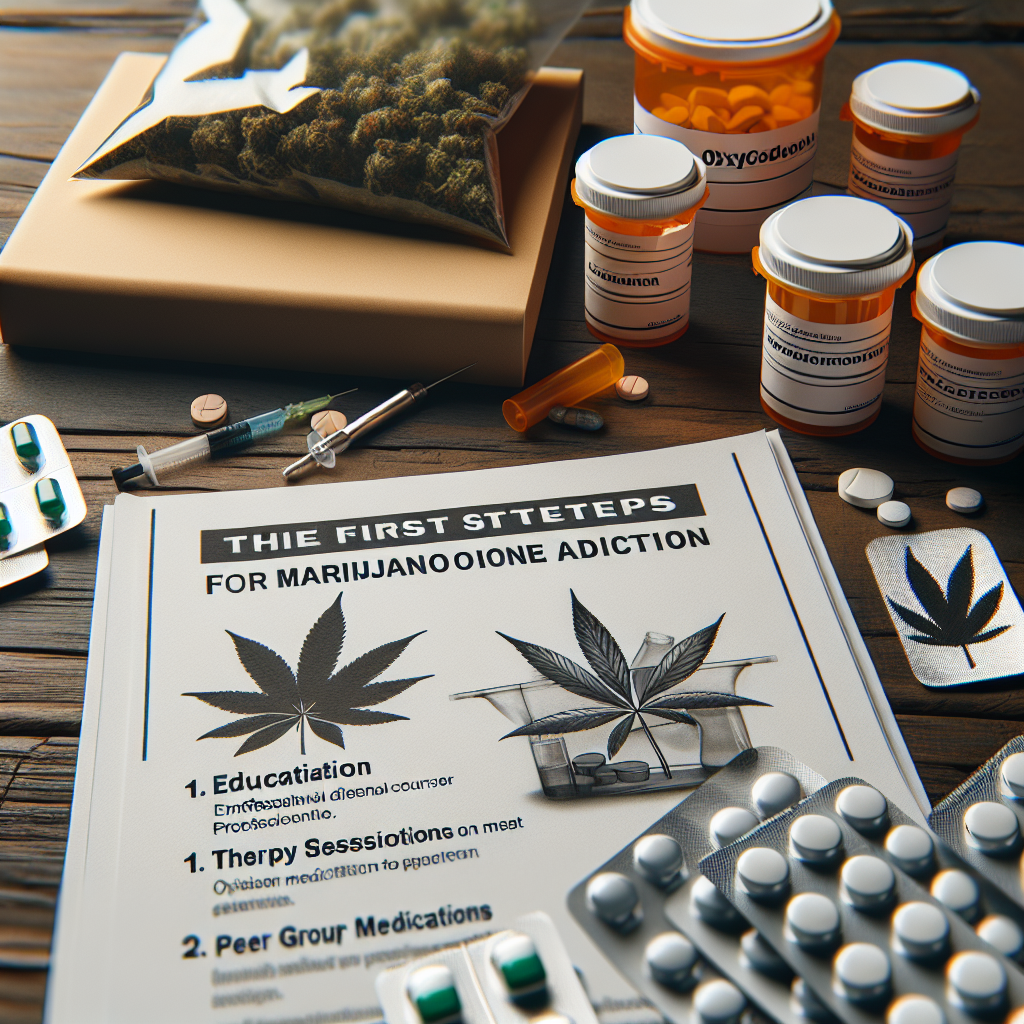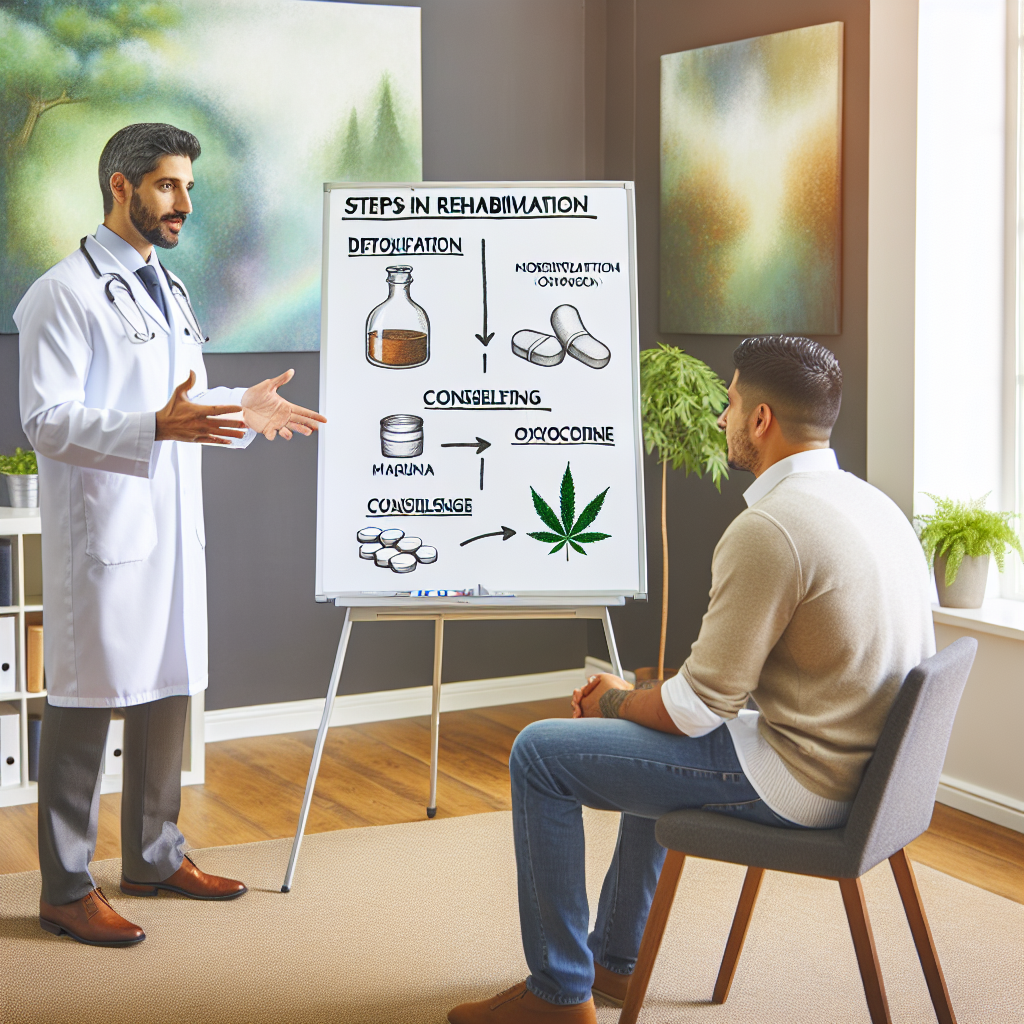-
Table of Contents

“Begin with acceptance, seek professional help, and commit to a personalized treatment plan.”
Introduction
The first steps in rehab for marijuana and oxycodone addiction typically involve a comprehensive assessment and detoxification process. During the assessment, healthcare professionals evaluate the individual’s physical and mental health, substance use history, and any co-occurring disorders to create a personalized treatment plan. Detoxification, or detox, is the process of allowing the body to rid itself of the substances while managing withdrawal symptoms in a safe and controlled environment. This phase is crucial for stabilizing the individual and preparing them for the subsequent stages of rehabilitation, which may include therapy, counseling, and support groups.
Understanding The Initial Assessment Process In Rehab For Marijuana And Oxycodone Addiction
Embarking on the journey to overcome addiction to substances like marijuana and oxycodone is a courageous and transformative decision. The first steps in rehab are crucial, as they lay the foundation for a successful recovery. Understanding the initial assessment process can provide clarity and reassurance for those taking this brave step.
The initial assessment in rehab serves as a comprehensive evaluation of the individual’s physical, psychological, and social health. This process begins with a detailed intake interview conducted by a team of healthcare professionals, including doctors, therapists, and counselors. During this interview, the individual is encouraged to share their history of substance use, including the frequency and quantity of marijuana and oxycodone consumption. This information is vital for creating a personalized treatment plan tailored to the individual’s specific needs.
Following the intake interview, a thorough medical examination is conducted to assess the individual’s physical health. This examination helps identify any underlying medical conditions that may have been exacerbated by substance use. For instance, prolonged use of oxycodone can lead to respiratory issues, while chronic marijuana use may impact cognitive function. By identifying these health concerns early on, the medical team can address them promptly, ensuring a safer and more effective recovery process.
In addition to the medical examination, a psychological evaluation is performed to understand the individual’s mental health status. This evaluation helps identify any co-occurring mental health disorders, such as depression or anxiety, which are common among individuals struggling with addiction. Recognizing and treating these disorders concurrently with addiction is essential for a holistic recovery approach. The psychological evaluation also explores the individual’s emotional triggers and coping mechanisms, providing valuable insights for developing effective therapeutic interventions.
As part of the initial assessment, the individual’s social environment is also examined. This includes understanding their family dynamics, social support systems, and living conditions. A supportive and stable environment is crucial for recovery, and identifying any potential challenges in the individual’s social context allows the rehab team to address them proactively. For example, if the individual lacks a supportive home environment, alternative living arrangements, such as sober living homes, may be recommended.
Once the initial assessment is complete, the rehab team collaborates to develop a comprehensive treatment plan. This plan is tailored to the individual’s unique needs and may include a combination of medical detoxification, behavioral therapies, and support groups. Medical detoxification is often the first step, especially for individuals with oxycodone addiction, as it helps manage withdrawal symptoms and ensures a safe transition to sobriety. For marijuana addiction, detoxification may be less intense but still necessary to cleanse the body of the substance.
Behavioral therapies, such as cognitive-behavioral therapy (CBT) and motivational interviewing, play a pivotal role in addressing the psychological aspects of addiction. These therapies help individuals understand the underlying causes of their substance use, develop healthier coping strategies, and build resilience against relapse. Support groups, such as Narcotics Anonymous (NA) or Marijuana Anonymous (MA), provide a sense of community and shared experience, fostering a supportive network that encourages long-term recovery.
In conclusion, the initial assessment process in rehab for marijuana and oxycodone addiction is a multifaceted approach that addresses the individual’s physical, psychological, and social well-being. By conducting a thorough evaluation and developing a personalized treatment plan, rehab centers empower individuals to embark on their recovery journey with confidence and hope. This comprehensive approach not only paves the way for overcoming addiction but also lays the groundwork for a healthier, more fulfilling life.
The Importance Of Detoxification In The First Steps Of Rehab For Marijuana And Oxycodone Addiction
Embarking on the journey to overcome addiction to substances like marijuana and oxycodone is a courageous and transformative decision. The first steps in rehab are crucial, as they lay the foundation for a successful recovery. One of the most critical components of these initial steps is detoxification, a process that helps to cleanse the body of harmful substances and prepare the individual for the subsequent stages of treatment. Understanding the importance of detoxification can inspire and motivate those struggling with addiction to take that vital first step towards a healthier, more fulfilling life.
Detoxification, often referred to as detox, is the process by which the body rids itself of toxic substances. For individuals addicted to marijuana and oxycodone, detoxification is essential because it addresses the physical dependency on these substances. This phase is not merely about abstaining from drug use; it involves managing withdrawal symptoms and ensuring that the individual is medically stable. The detox process can vary in length and intensity depending on the substance, the duration of use, and the individual’s overall health.
For those addicted to marijuana, detoxification might seem less daunting compared to other substances. However, it is important to recognize that marijuana withdrawal can still present significant challenges. Symptoms such as irritability, anxiety, insomnia, and cravings can make it difficult for individuals to maintain their resolve. During this period, medical professionals provide support and guidance, helping individuals manage these symptoms and reduce the risk of relapse. This support is crucial in building the confidence needed to continue with the rehabilitation process.
On the other hand, detoxification from oxycodone, a powerful opioid, can be more intense and requires careful medical supervision. Oxycodone withdrawal symptoms can include severe muscle pain, nausea, vomiting, diarrhea, and intense cravings. The discomfort associated with these symptoms can be overwhelming, making it essential for individuals to undergo detox in a controlled and supportive environment. Medical professionals may use medications to alleviate withdrawal symptoms and ensure the individual’s safety and comfort. This medical support not only eases the physical burden of detox but also provides emotional reassurance, reinforcing the individual’s commitment to recovery.
As individuals progress through detoxification, they begin to experience the initial benefits of a substance-free life. Physical health starts to improve, and mental clarity begins to return. This newfound sense of well-being can be incredibly motivating, serving as a powerful reminder of the positive changes that lie ahead. Detoxification is not an end in itself but a necessary precursor to the comprehensive treatment that follows. It prepares individuals for the therapeutic work that will address the psychological and behavioral aspects of addiction.
In addition to the physical benefits, detoxification also offers an opportunity for individuals to reflect on their journey and set intentions for their recovery. It is a time to acknowledge the strength it takes to confront addiction and to recognize the support systems that will be instrumental in the healing process. Family, friends, and healthcare providers play a vital role in this phase, offering encouragement and reinforcing the individual’s determination to succeed.
Ultimately, the importance of detoxification in the first steps of rehab for marijuana and oxycodone addiction cannot be overstated. It is a critical phase that paves the way for lasting recovery, providing the physical and emotional stability needed to engage fully in subsequent treatment. By understanding and embracing the detoxification process, individuals can take the first step with confidence, knowing that they are on the path to reclaiming their lives and achieving a brighter, healthier future.
Q&A
1. What are the first steps in rehab for marijuana addiction?
– The first steps typically include an initial assessment by a healthcare professional to determine the severity of the addiction, followed by a detoxification process if necessary, and the development of a personalized treatment plan that may include therapy and support groups.
2. What are the first steps in rehab for oxycodone addiction?
– The first steps generally involve a comprehensive medical evaluation to assess the individual’s health and addiction severity, followed by a medically supervised detoxification to manage withdrawal symptoms, and the creation of a tailored treatment plan that may include medication-assisted treatment, counseling, and behavioral therapies.
Conclusion
The first steps in rehab for marijuana and oxycodone addiction typically involve a comprehensive assessment to determine the individual’s specific needs, followed by a medically supervised detoxification process to manage withdrawal symptoms safely. This is often accompanied by the development of a personalized treatment plan that includes behavioral therapies, counseling, and support groups to address the psychological aspects of addiction.



